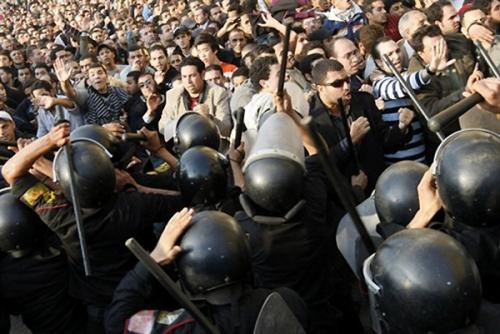CAIRO: Egypt and Tunisia expect vital financial aid from the great powers at this week’s Group of Eight (G8) summit of wealthy nations to help save their political transitions from economic quagmire.
The collapse of these pioneers of the "Arab Spring" could sound the death knell for democratic hopes in the region and strengthen repressive regimes while providing a boost for radical movements, politicians and analysts say.
"We hope that the international community understands that the risk of failure of the Tunisian revolution is not only for the Arab region but also for world peace," said Tunisian economist Mohamed Ben Romdhane.
More than four months after the overthrow of president Zine El Abidine Ben Ali, Tunisia is grasping for political stability and "has an overriding need for economic support," he said.
In Egypt, where protesters inspired by Tunisia’s revolt overthrew their own strongman Hosni Mubarak in 18 days, the ruling military and government have warned that the economy is in dire state.
"The Egyptian economy is in a serious impasse with the absence of security forces, sectarian strife and rising social movements," said Ibrahim Issawi, an economist with the petroleum ministry.
Police have only just begun feeling confident enough to do their work, after the battering they took during the revolt, and the country has seen a spike in deadly clashes between Muslims and Coptic Christians.
Support for Tunisia and Egypt at the G8 annual summit that gathers May 26 and 27 in France is also meant to send a message to such countries as Libya and Syria, where protests were met with overwhelming force.
US President Barack Obama, without waiting for the meeting to get underway, has already pledged billions of dollars to help bolster democracy in the region.
In a keynote Middle East speech last week addressing the Arab uprisings, Obama announced that Washington would erase $1 billion in Egyptian debt and guarantee $1 billion in borrowing.
After the euphoria of overthrowing two veteran and seemingly unshakable strongmen, Tunisia and Egypt are now fixated on how to bolster their economies amid a blow to tourism and rising unemployment.
Egypt estimates it needs between $10 and $12 billion in international funding to keep it going until mid-2012.
Negotiations are underway with the International Monetary Fund for $3-4 billion, and with the World Bank for roughly two billion.
Tourism, one of Egypt’s key earners and source of employment, has already recorded 2.2 billion in losses since the revolt began in January and unrest has cost the treasury more than $1 billion, officials say.
The number of tourists visiting Egypt also dropped by 46 percent in the first three months of the year.
Growth in Egypt, the most populated Arab nation with around 84 million inhabitants, will reach between one and two percent this year, down from the projected six percent.
The situation is not better in Tunisia, where growth could reach between zero and one percent, due mostly to lost tourism revenues and the government fears unemployment could jump to 20 percent, from 13 percent last year.
Some economists, however, say these two countries will first have to get their houses in order for aid to work.
"Egypt needs a clear vision of its own political situation before it can ask any country for economic assistance or for more investments," said Gamal Bayumi, the head of an Arab investors’ union in Cairo.

